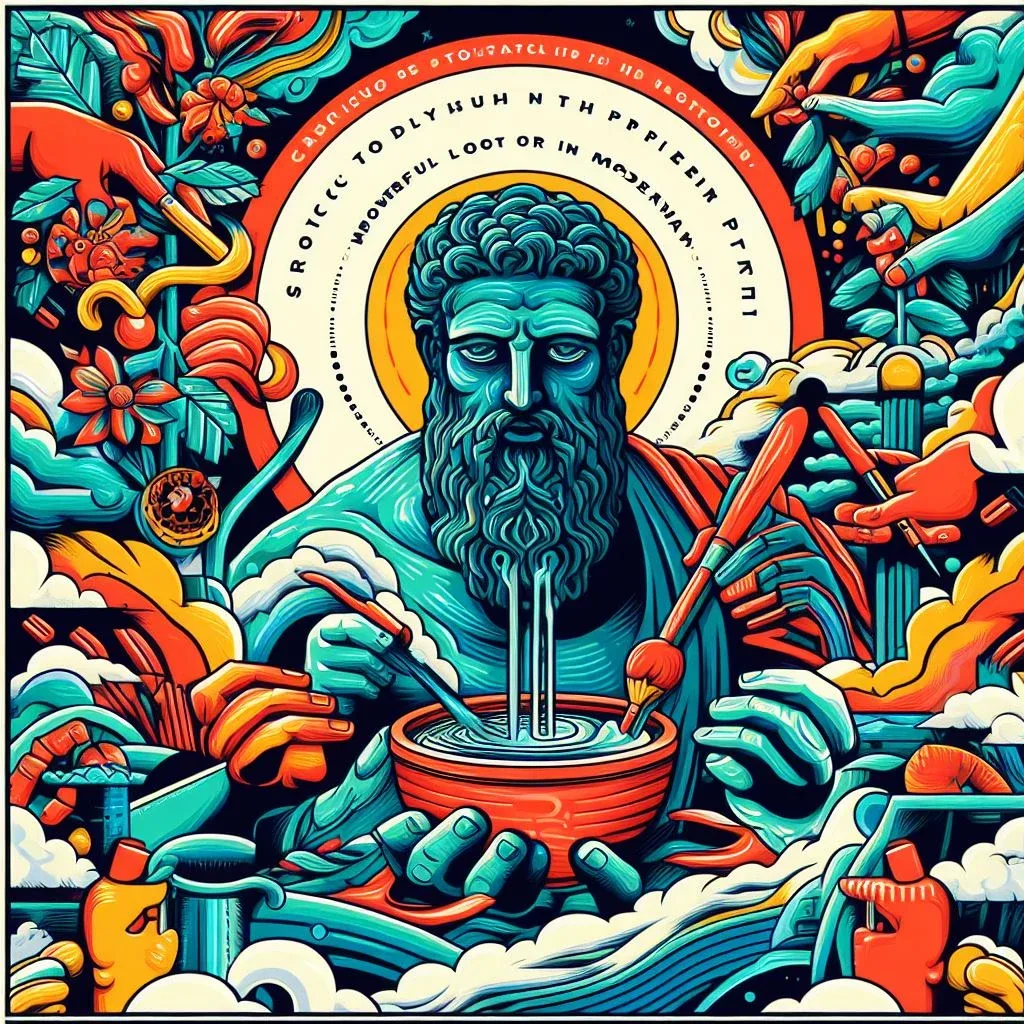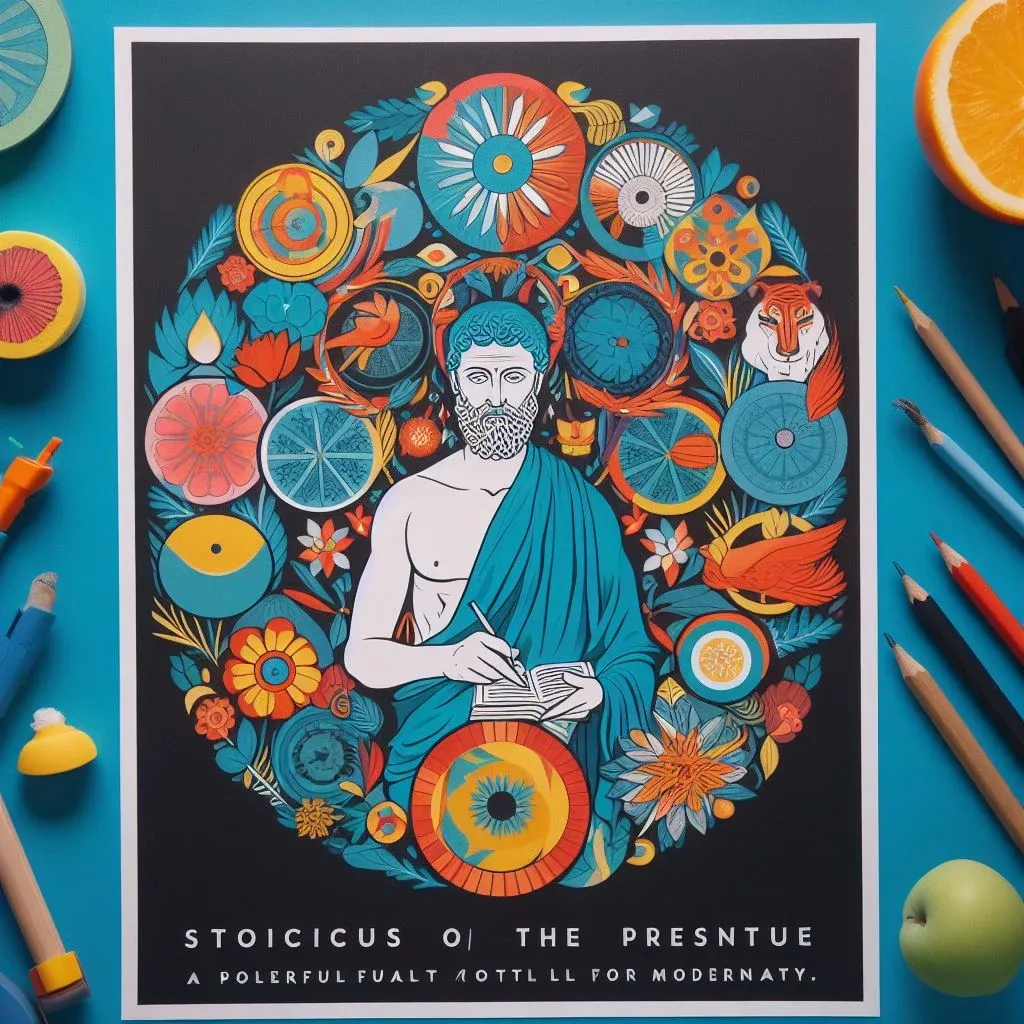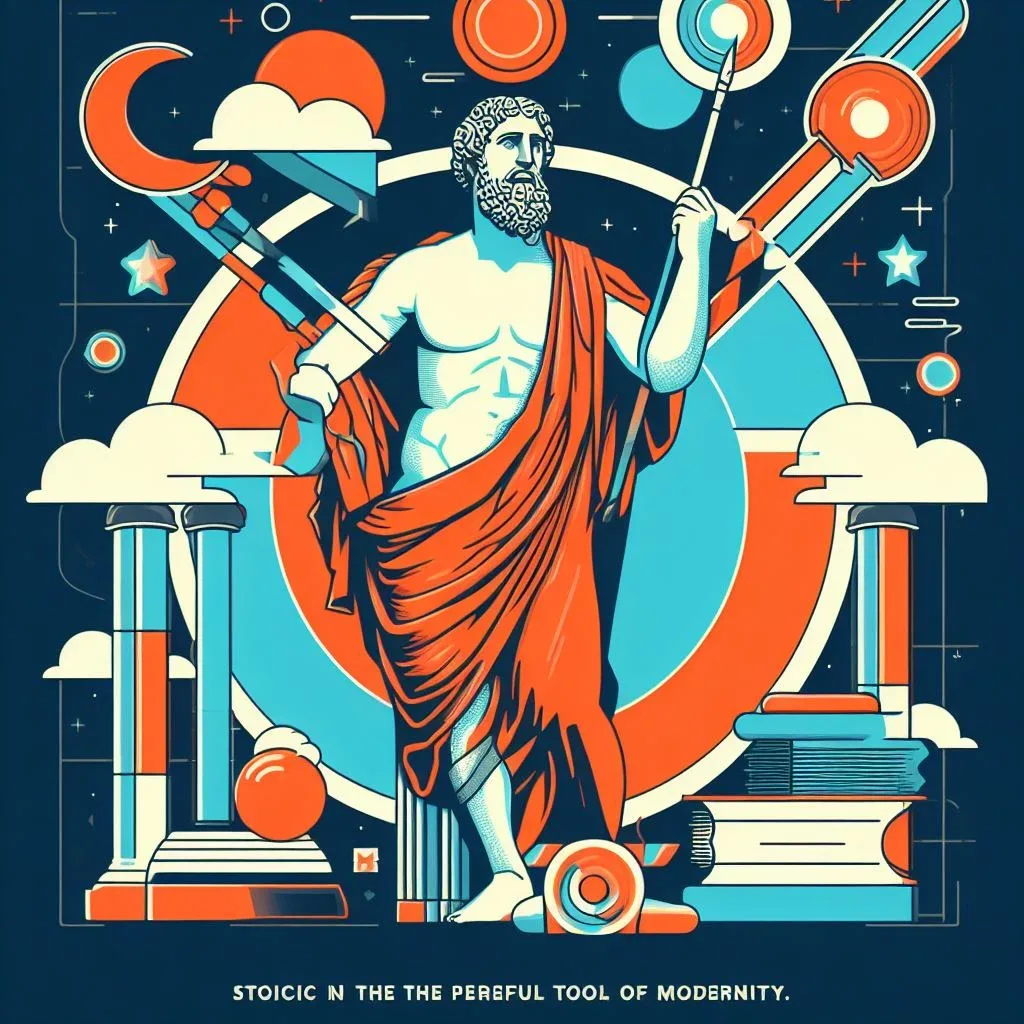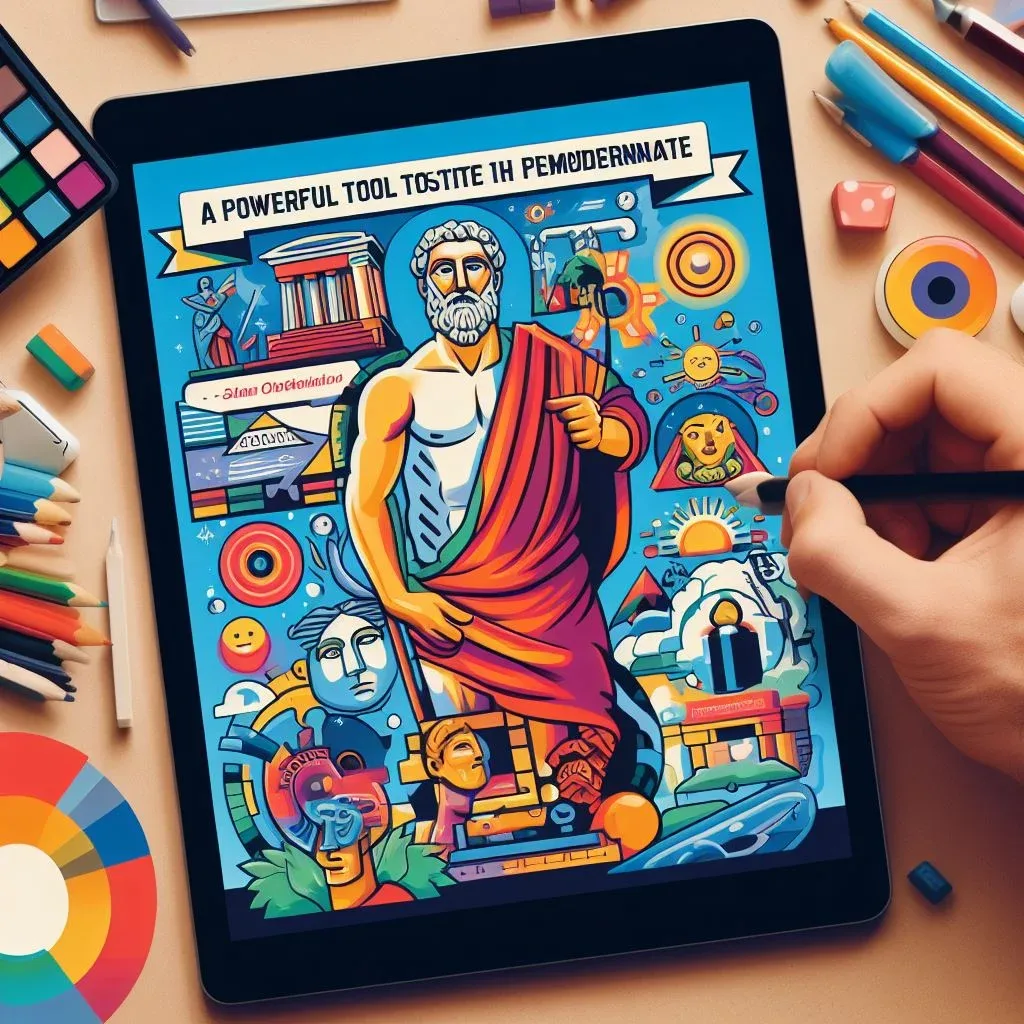Introduction to Stoicism
Stoicism, an ancient school of philosophy centuries in the making, remains a source of wisdom and clarity in our modern, unpredictable world. Founded by Zeno of Citium in the XNUMXrd century BC, Stoic philosophy is celebrated for its emphasis on living in accordance with nature, understanding what can be controlled and calmly accepting what is beyond our control.

Concentrated around four structural virtues – wisdom, courage, justice and temperance – Stoic philosophy teaches us that possessing a strong character and moral adherence to virtue are the main indicators of a good life. The essence of Stoicism is to build resistance in the face of chaos and adversity through the understanding that the path to inner tranquility lies in our establishment of perceptions and reactions.
The Relevance of Stoicism in the Contemporary World
Although Stoicism's roots may go deep into the past, its principles and lessons are as relevant today as they have ever been. We live in an era of rapid change, ceaseless technological advances, and a cascade of information that is a constant in our everyday lives. In this dynamic scenario, stoicism offers a safe haven, guidance to navigate life with greater serenity, insight and resilience.

Modern life is marked by insecurity, the “fear of missing out” or FOMO (fear of missing out), the overload of information (or infoxication) and chronic stress, both in the work environment and in personal life. These concerns of the contemporary world can be managed and even transformed through a stoic interpretation of life.
In a world where happiness is often mistaken for materialistic gratification and instant satisfaction, Stoicism reminds us of the value of self-mastery, patience, gratitude, and personal growth through challenges and adversity.
The Four Stoic Virtues for the XNUMXst Century

Wisdom
Stoic wisdom is rooted in understanding the distinction between what we can control and what we cannot. In our age of information overload and constant distractions, this distinction becomes even more relevant. Stoic wisdom guides us to direct our energy where it is effective, to choose carefully where we place our attention and in which activities we invest our time and effort. With wisdom, we learn to select the battles we fight, reserving our resources for issues that are within our control.
Courage
Courage, in the Stoic sense, is not limited to acts of physical bravery. It is very much about moral courage – the will to remain authentic, to live according to high principles, even in the face of criticism or social ostracism. In today's world, where popularized trends and social conformity can easily impact our judgment, Stoic courage encourages us to be true to ourselves and our value system, regardless of outside opinions.
Justice
The Stoics defend a supportive vision of humanity, where each individual is an integral part of a large global community. They teach the importance of treating others with fairness, kindness and understanding. This is perhaps one of his most relevant teachings in today's polarized climate, where respect and compassion are sometimes overlooked.
Temperance
Temperance, referring to self-discipline and moderation, is another pillar of Stoicism. It seems like a suitable solution to counter the current culture of indulgence and excessive consumption. This is not only a resource against materialism, but also a way to rescue our self-control and self-mastery.
Stoicism and Mental Resilience

A central element of Stoicism is focusing on what is within our control, particularly our perceptions and reactions to situations. This Stoic teaching is fundamental to developing mental resilience. Instead of being swept along by the waves of external and emotional circumstances, we learn to be our own pilots, navigating the storm with calm and composure.
Stoic philosophers teach that suffering and adversity are part of life. They are not enemies to be avoided, but potentially powerful teachers. Thus, they encourage us to treat difficulties as opportunities for character strengthening, personal growth, and self-reflection.
Mental resilience, cultivated through stoicism, is a crucial resource in today's world. It helps manage stress, reduce anxiety, maintain emotional stability and increase life satisfaction.
Stoicism and Stress Management

In modern society, stress has become an insidious constant that permeates all aspects of life. The rapid pace of change, constant demands for our attention, and the challenge of balancing multiple responsibilities can easily trigger feelings of overwhelm and anxiety. Here, Stoicism has a lot to offer.
Stoic philosophy teaches us to discern between what is in our control and what is not. Most of our concerns arise from circumstances beyond our direct control. Stoicism suggests a shift in mindset – instead of spending energy worrying about factors we can't influence, we focus on our own reactions and attitudes.
For example, we can't control tight work deadlines, but we can control our organization, how we prioritize our time, and how we react to stress. This focus on action rather than worry can significantly reduce stress and promote inner peace.
Stoicism as an Antidote to the “Age of Distraction”

We live in the “age of distraction”, where we are constantly bombarded by information from our digital devices. This information overload can lead to mental fatigue, stress, and a feeling of being constantly “on.”
The Stoic teachings of focusing on ourselves and our reactions provide a significant antidote to this scenario. The Stoics highly valued attention – the ability to be fully present and engaged in the moment, a skill that is challenged in our hyperconnected world.
Stoic practices such as meditation and daily reflection can help cultivate this mindfulness, slowing down the mind and focusing on our actions and reactions. This allows us to approach life from a calmer, more considered perspective, avoiding the distraction and noise of the digital world.
Stoic Practices in Everyday Life

Studying Stoicism is not just a theoretical exercise. To truly absorb its teachings, we must practice it in our daily lives. This may mean adopting daily reflection practices, such as questioning our automatic reactions to situations and assessing whether we are living in accordance with our values and principles.
Another key practice is “negative visualization,” which involves contemplating impermanence and the possibility of losing what we have. This may sound grim, but it's actually a powerful strategy for nurturing gratitude and strengthening mental resilience in the face of adversity.
Keeping a Stoic journal is also a best practice. Writing daily reflections can help consolidate learnings and provide greater perspective on our ongoing thoughts and feelings.
Conclusion
It is clear, therefore, that Stoicism has deep and lasting value for all of us, living in our modern and often chaotic world. The timeless principles rooted in this ancient philosophy offer a path toward resilience, inner peace, and, ultimately, a life well lived.
Practicing Stoicism strengthens the foundation of our lives – the character and awareness of our own thoughts, actions and reactions. In a world of constant change and uncertainty, having that solid foundation to fall back on is not only comforting but also empowering. Stoicism today is as relevant and vital as it has ever been.
Remember, Stoicism is not a panacea nor an escape from real life – it is a tool, a compass, that can help us navigate life's challenges with greater grace, composure, and wisdom. And in doing so, it takes us one step closer to a truly good and meaningful life.
Frequently Asked Questions about Stoicism today

1. What is stoicism?
Stoicism is an ancient philosophy founded in the XNUMXrd century BC by Zeno of Citium. Philosophy is based on four virtues: wisdom, courage, justice and temperance.
2. How is Stoicism relevant today?
Stoicism is relevant in modern life as it provides effective strategies for dealing with situations of stress, anxiety and uncertainty. Offers resources to build mental resilience and promote focus on what we can control.
3. What aspects of contemporary life can Stoicism help to deal with more effectively?
Stoicism can help you deal with a variety of situations, such as information overload, the stress of deadlines, anxiety, and the challenges of the age of digital distraction. Teaches the value of mindfulness, resilience and internal focus.
4. How can stoicism help with stress management?
Stoicism promotes understanding between what we can and cannot control. This perspective helps us direct our energy and attention where it is most effective, reducing worry related to things outside of our control.
5. How can stoicism help me in an age of constant distraction?
Stoicism promotes mindfulness and focusing on what is within our control, thus offering an effective strategy for dealing with a world full of information and constant distraction. Through reflection and self-mastery practices, it is possible to better navigate a hyperconnected world.
6. How can I incorporate Stoicism practices into my daily routine?
Stoic practices can include daily practices of reflecting on our reactions and behaviors, exercising self-control, keeping a stoic journal for reflections, and strive to live according to the principles of wisdom, courage, justice, and temperance.
7. Does stoicism discourage emotions?
No, stoicism does not discourage emotions. Instead, it encourages deep reflection on our emotional reactions and promotes self-mastery. Stoics understand that we cannot avoid emotions, but we can control how we respond to them.
8. How can Stoic teachings be applied to the workplace?
In the workplace, stoicism can help with managing stress, making more considered decisions and approaching conflicts in a more constructive way. Additionally, the Stoics' emphasis on understanding what is within our control can help with setting goals and focusing efforts to achieve them.
9. Is Stoicism a pessimistic philosophy?
No, Stoicism is not a pessimistic philosophy. Although it encourages reflection on possible adversities and difficulties we may face, the intention is to cultivate resilience, gratitude and learn to value what we have.
10. Who were some of the most famous Stoic philosophers?
Some of the most famous Stoic philosophers were Seneca, Epictetus, and Marcus Aurelius. His works remain a rich source of wisdom and guidance on how to practice Stoicism in everyday life.






